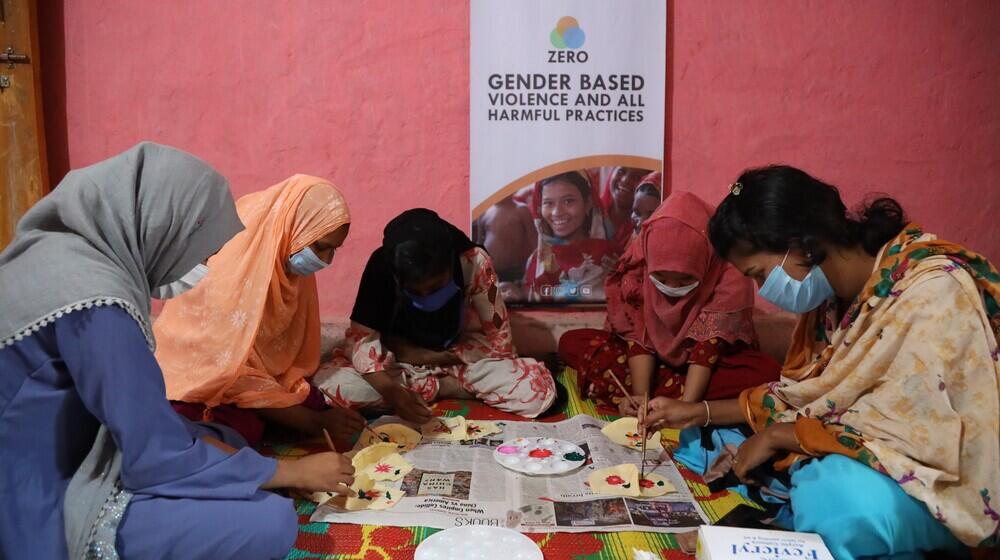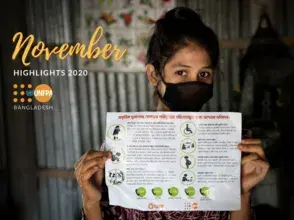Cox’s Bazar, Bangladesh, 9 September 2021 – August 2021 marked four years since almost a million Rohingya people fled to Bangladesh from neighbouring Myanmar, settling in a broad network of refugee camps in the coastal city of Cox’s Bazar. Rendered stateless, the Rohingya were seeking dignity, rights and protection from persecution. The Government and people of Bangladesh were the first responders to the crisis and even after four challenging years, they continue to generously host more than 860,000 Rohingya refugees in Cox’s Bazar district.
With the support of UN agencies and over 130 national and international NGOs, the Government of Bangladesh continues to provide life-saving assistance. All this time, UNFPA has had the honour of being a part of these efforts and continues to constantly devise new ways to respond to the varied and evolving needs of the refugees, and also support the local host communities of Cox’s Bazar.
Here are just some of the stories of the support UNFPA is providing to safeguard the sexual and reproductive health and rights of the refugees, and to help prevent and respond to gender-based violence and harmful practices against women and girls.
Safe places, emotional relief: UNFPA’s Women Friendly Spaces
As a result of the refugee crisis, Cox’s Bazar is home to some of the most vulnerable women and girls on Earth, many of whom were subjected to rape and other horrendous forms of gender-based violence in the past.
To help women and girls overcome their traumatic experiences, UNFPA supports a network of 28 Women Friendly Spaces in the camps and surrounding host communities. The Women Friendly Spaces provide women and girls a safe space where they gather to interact with each other and engage in recreational activities such as henna making, tailoring, tie-dyeing and drawing.
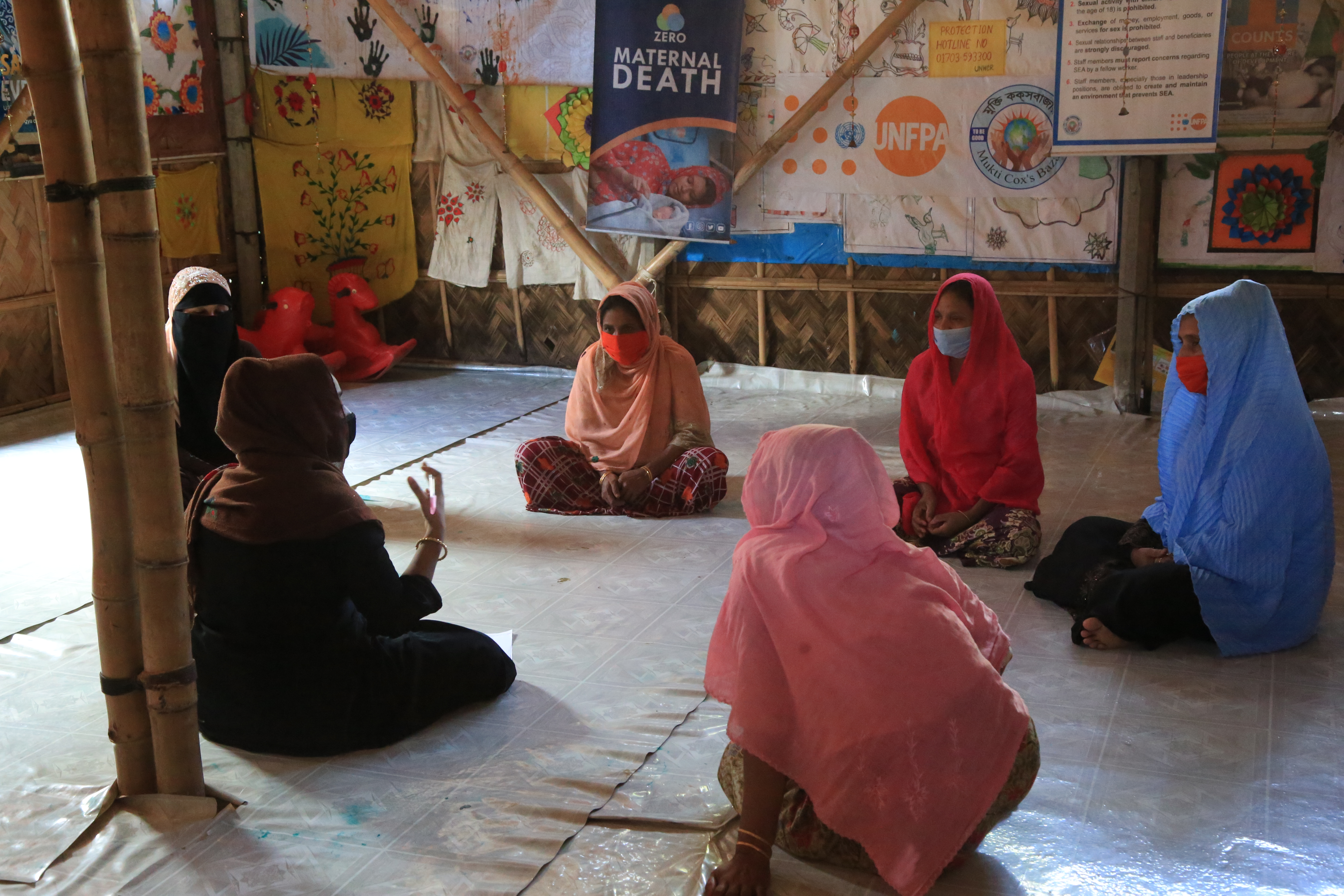
Even amid the COVID-19 pandemic, women and girls in the camps have been able to meet each other in the Women Friendly Spaces. Photo: UNFPA/Fahima Tajrin
In addition, each Women Friendly Space employs midwives and caseworkers to provide emotional and psychosocial support and to host awareness raising sessions on crucial issues like gender-based violence, safe pregnancy and childbirth, family planning, , healthy relationships, child marriage and human trafficking.
Hamida, a 27-year-old Rohingya woman who began to attend the awareness raising sessions shortly after arriving in the camps in 2017 was immediately inspired by the new things she was learning about. “I realized that information is power and I started looking for opportunities to develop myself, as well as for ways to contribute to the collective betterment of my community,” she recalls.
In no time, she had become a teacher and mentor for other women in the camps through the Women Support Groups peer outreach initiative. The Women Support Groups are a network of thousands of female Rohingya camp volunteers, who advance the rights of Rohingya women to make autonomous choices about their bodies and lives.
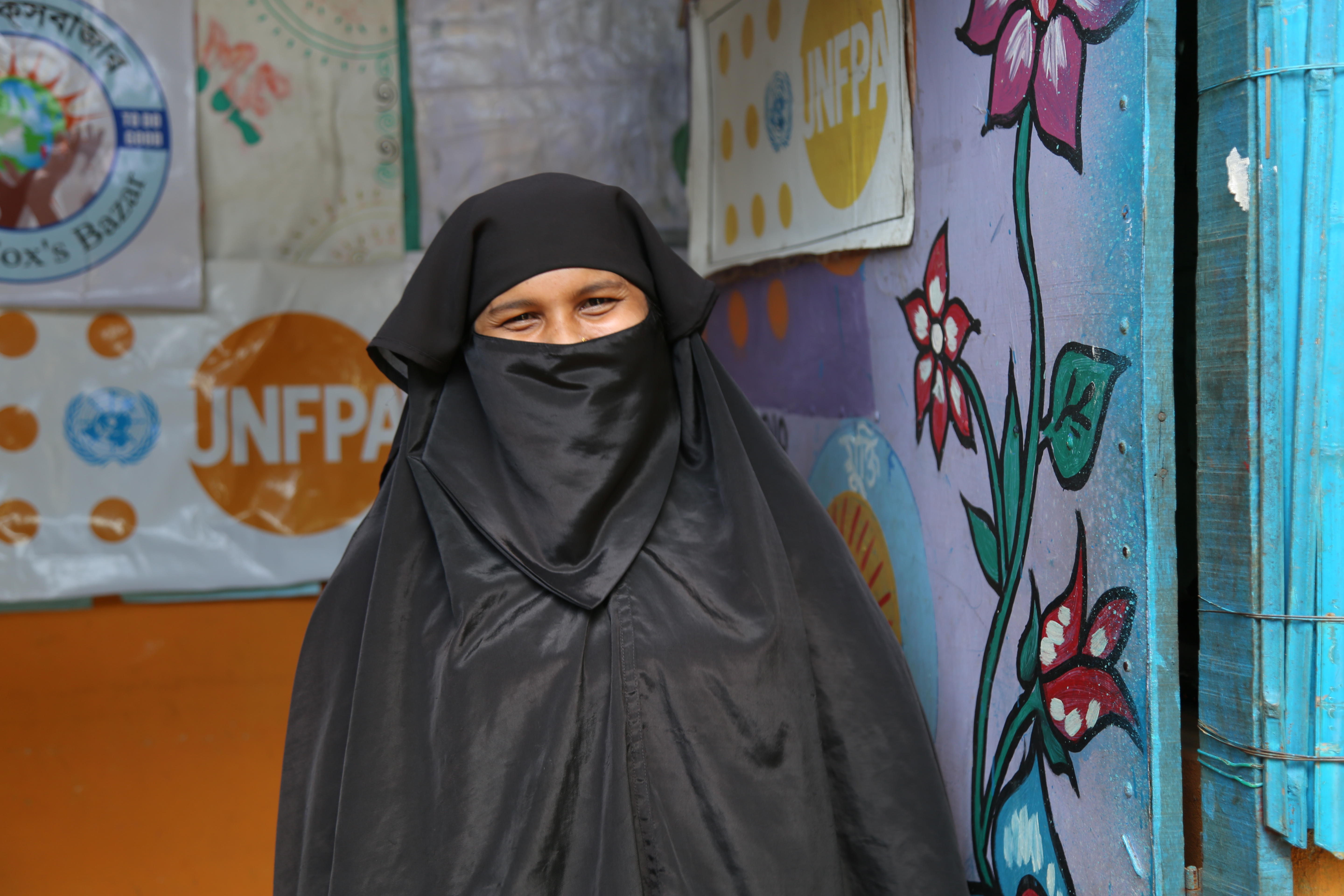
Being a member of the Women Support Groups has made Hamida more independent and confident in her own abilities. Photo: UNFPA/Fahima Tajrin
“Through my efforts to help other women and girls in the camps, I have gained the respect of my community, family members and husband. At first, no one listened to me. However gradually, they started to embrace me as they understood that information gives them choices and opportunities,” Hamida proudly declares.
Family planning methods and male engagement
In addition to building the network of Women Friendly Spaces since 2017, UNFPA has been active in ensuring that family planning services remain available to women and girls in the camps. Currently, 40 partners in the UNFPA-led Sexual Health and Reproductive Working Group are collaborating to provide family planning information and services in 193 health facilities in the camps and surrounding host communities. Just between January-December 2020, almost 1.3 million condoms were distributed to men in the targeted communities, and about 135,000 women have been reached with a variety of contraceptive methods, ranging from contraceptive pills and intrauterine devices to intramuscular injectables and implants.
To ensure that family planning information reaches communities at the grassroots level, UNFPA actively collaborates with religious leaders in the camps as part of awareness raising efforts.
Nour Kolil is a Rohingya cleric working with UNFPA. “My role as an Imam is to guide young couples on achieving a healthy and fulfilling marital union,” he explains. “For this, I strongly encourage them to visit health facilities to receive more information on sexual and reproductive health and rights. My message is always about the happiness of the couples, making sure they have the ability to ensure health, education and food for their children. Managing the size of the family is also crucial.”
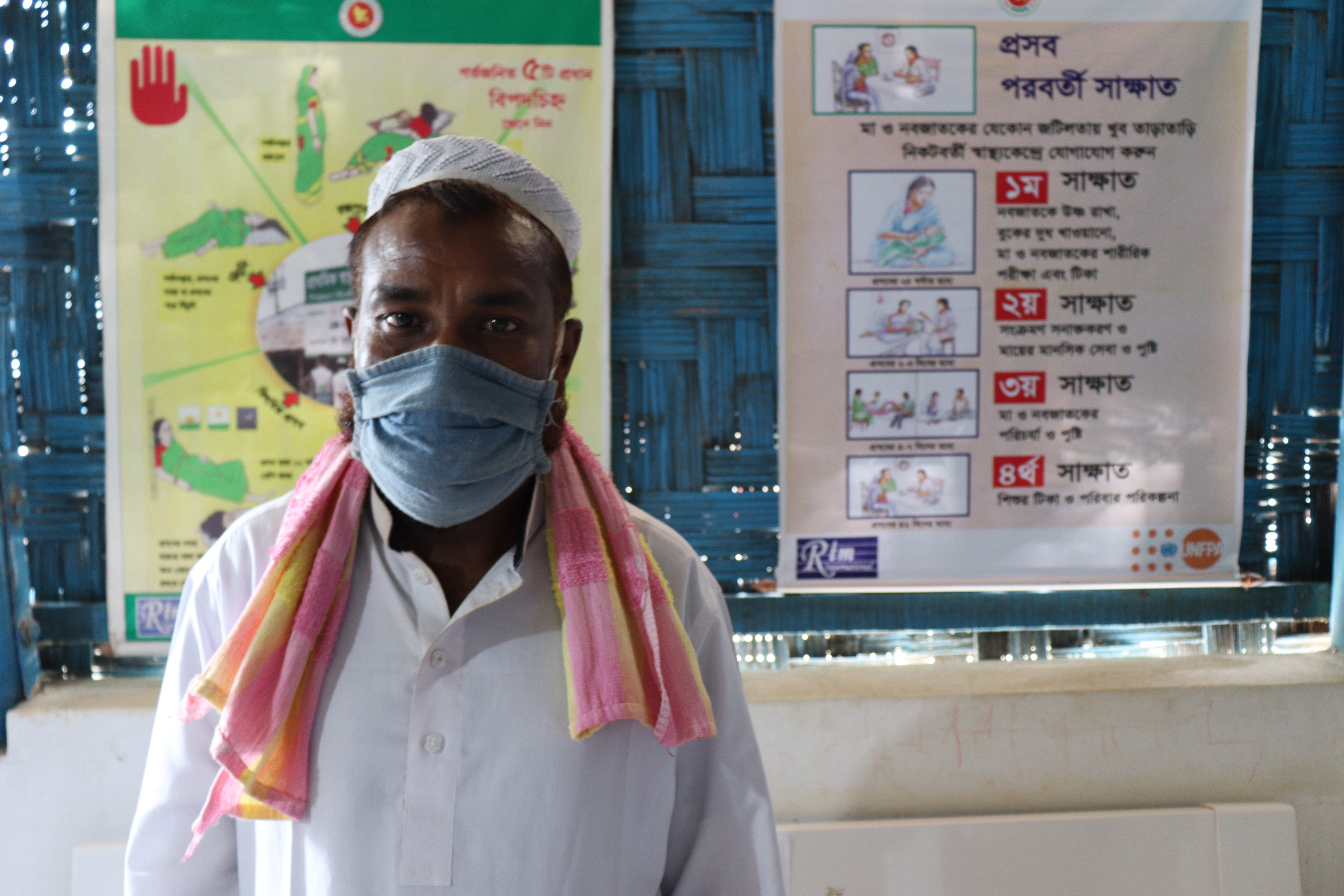
Imam Nour Kolil does not shy away from sensitive issues like family planning and contraception, when he interacts with his community. Photo: UNFPA/Fahima Tajrin
Through peer group counseling and courtyard meetings, special measures are also taken to ensure that information on family planning reaches men and boys in the camps. As men often carry more decision-making authority within Rohingya families, it is absolutely crucial that they are aware of the benefits of managing family size, birth spacing and women’s rights.
Midwifery services in the Women Friendly Spaces
In addition to securing the availability of family planning, significant measures have been taken to ensure that every pregnant woman in the camps has access to a safe delivery assisted by a midwife. Between 2018-2020, the number of deliveries performed in health facilities in the camps increased from 4,870 to 6,064, contributing significantly to preventing maternal deaths.
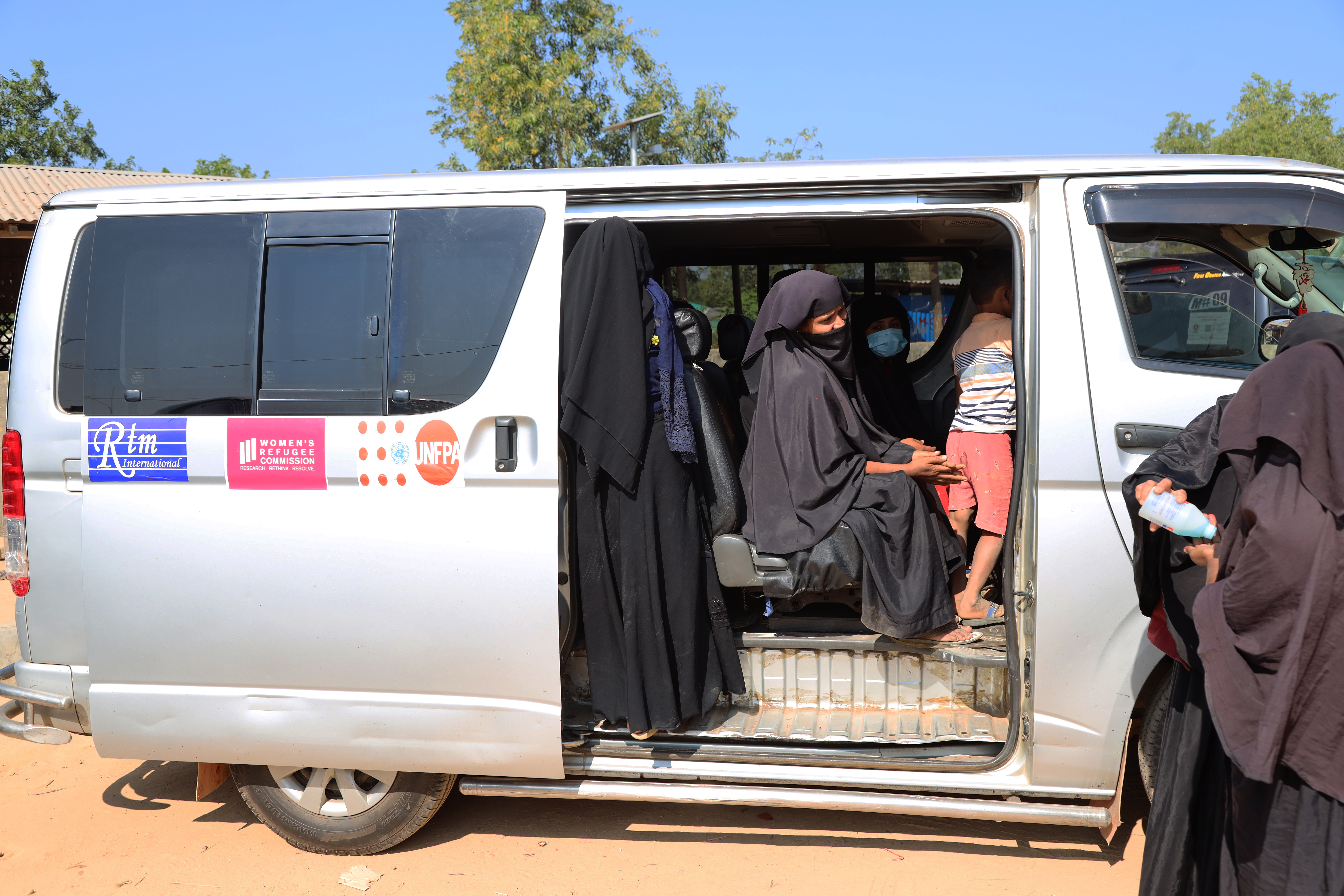
To ensure women’s access to midwifery services, UNFPA introduced the ‘Community-Based Patient Transportation System’ that provides free transportation to nearby health facilities. Photo: UNFPA.
Midwifery services have also been integrated into the Women Friendly Spaces, an approach which has proven to be particularly useful during the COVID-19 pandemic with its movement restrictions and other challenges.
“Each day, I serve about a dozen women who come to our midwifery room to request family planning methods, counselling and general information on bodily health,” says Jannatul, a 24-year-old midwife working in one of the Women Friendly Spaces. “I also give advice on preventing and treating sexually transmitted infections. I am happy that the women trust me with such issues. It is because my counselling is always respectful, confidential and non-judgmental.”
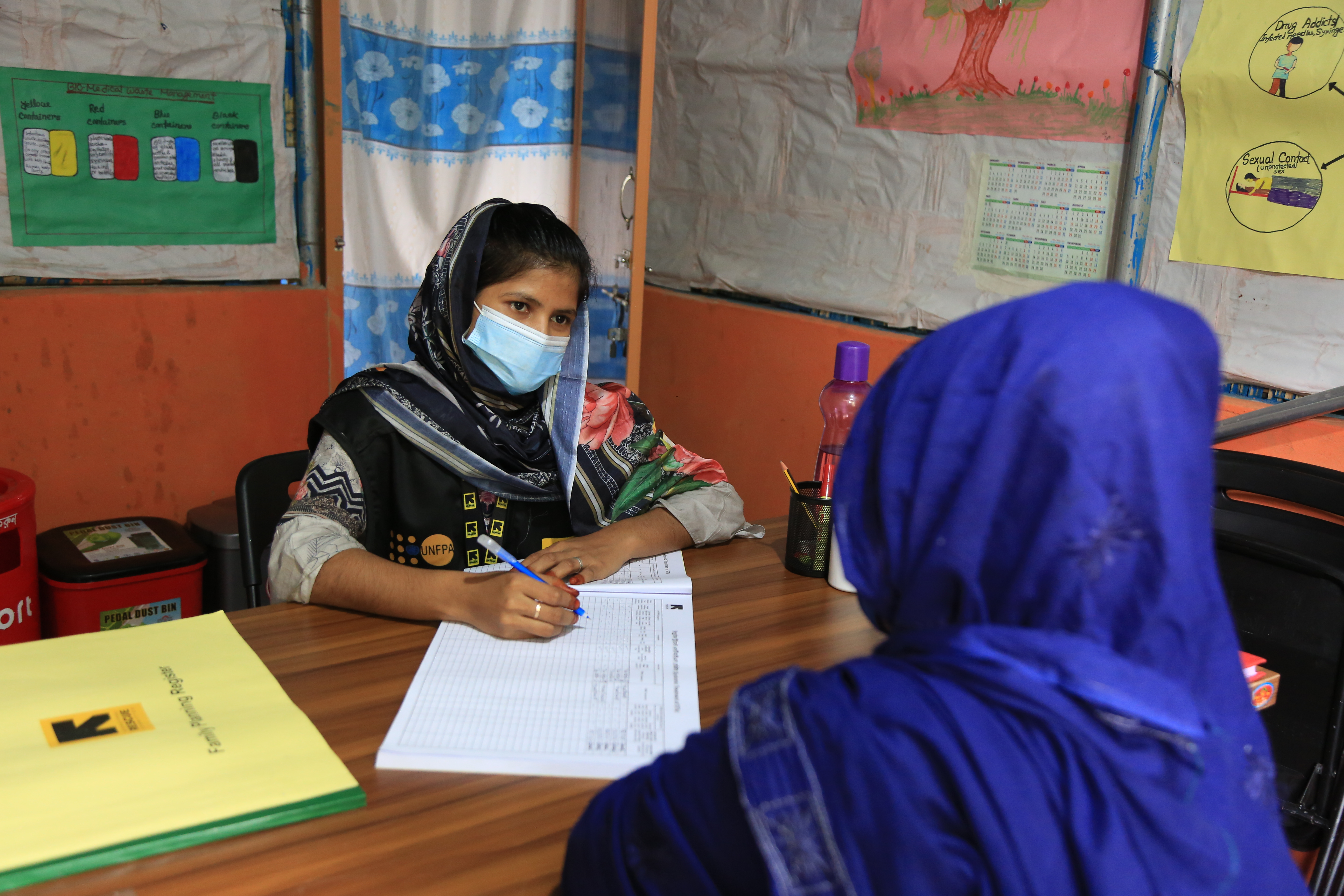
Midwife Jannatul feels that her non-judgmental demeanor makes it easy for women to come and consult her about sensitive issues. Photo: UNFPA/Fahima Tajrin.
Over a period of time, Women Friendly Spaces have become “go-to” places for women and girls to discuss sensitive topics.
“Since the midwifery room is always open, I find it a practical and comfortable place to consult about contraceptive methods. I like that I get to talk to another woman about women's issues,” explains Monowara, a resident of the camps who regularly visits the Women Friendly Spaces to discuss her needs with Jannatul.
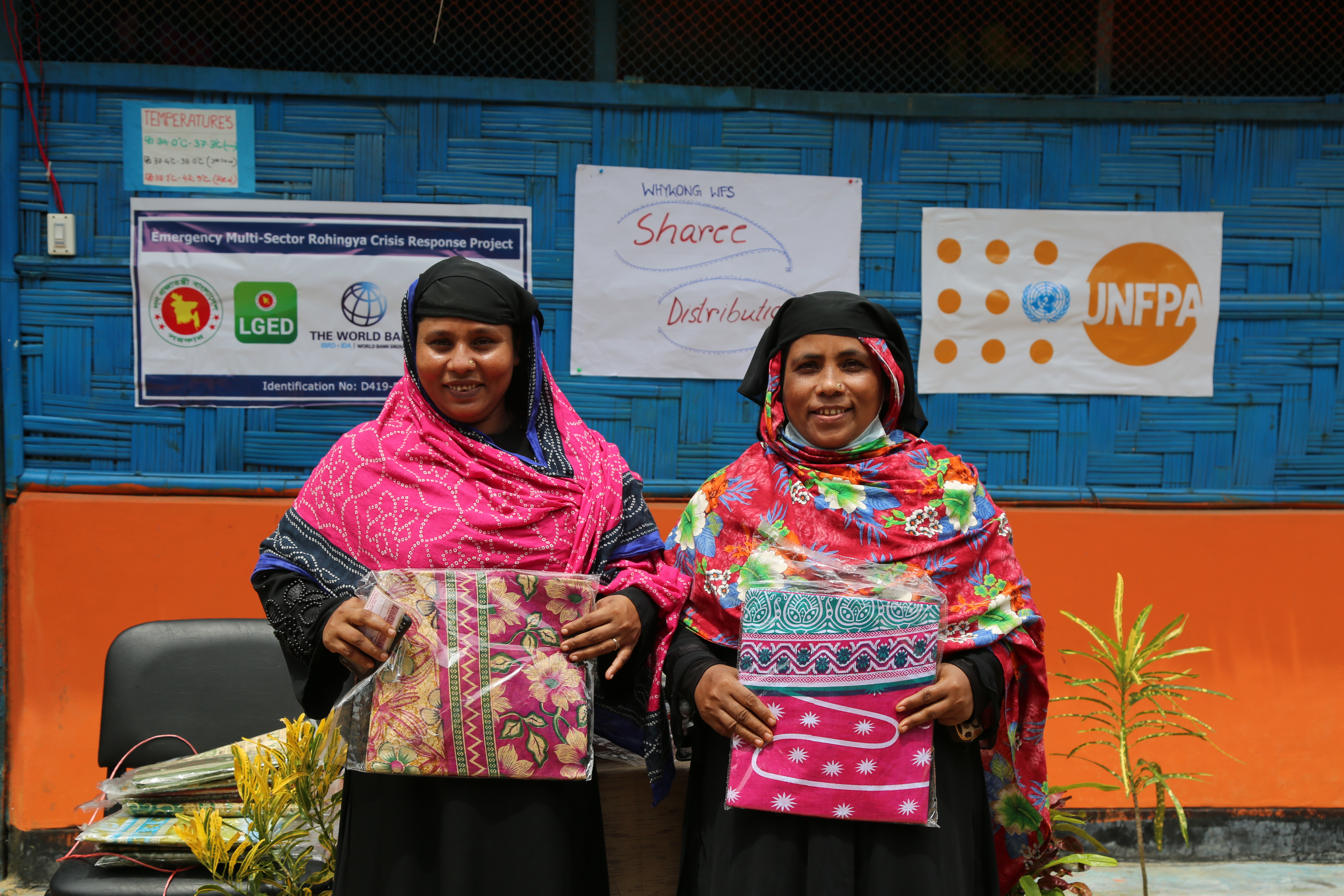
Best friends Mabia and Monowara love coming to the Women Friendly Space and discussing about their health with the UNFPA-supported midwives. Photo: UNFPA/Fahima Tajrin
Building the life-skills of adolescents through Psychosocial Support kits
In addition to ensuring the availability of comprehensive sexual and reproductive health services, UNFPA is working hard to address the various needs of the enormous youth population residing in the camps. Approximately 22 per cent of the Rohingya population in Cox’s Bazar consists of adolescents between the ages of 15 and 24.
Going through the complex psychological and physical changes of puberty is exceptionally difficult for them in the challenging conditions of the camps. To support Rohingya adolescents in making a smooth transition from childhood to adulthood, UNFPA has been providing gender-responsive life skills education in the camps since 2018. Just in 2020, almost 3,140 adolescent boys and girls participated in the programmes, equipping them with crucial skills to better cope with the daily challenges they face as adolescents in the camps.
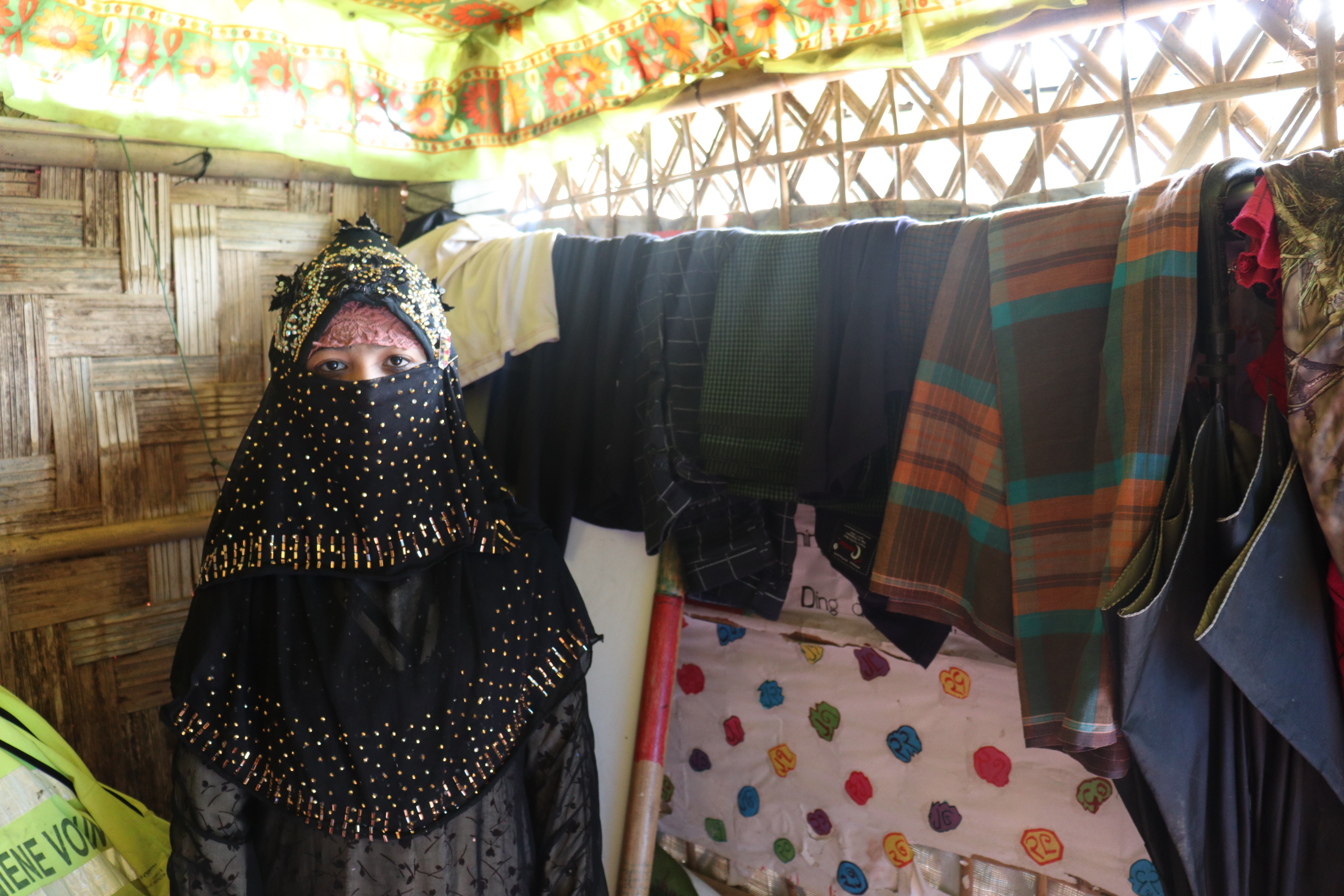
Through UNFPA’s life skills education programmes, 17-year-old Mokaroma learnt about things she had never even heard about. Photo: UNFPA/Fahima Tajrin
17-year-old Mokaroma, a graduate of one of UNFPA’s life skills education programmes, cannot contain her enthusiasm as she describes the various things she learned about sexual and reproductive health, gender norms and COVID-19 during the sessions.
“Before coming to Bangladesh, I used to go to school, but I was taught little about things like the negative effect child marriage and early pregnancy have on young girls,” she shares. “After attending the learning sessions, both me and my parents now know why child marriage is harmful. I don’t want to get married now, as I want to study more. I am happy that my family fully supports me in this decision!”
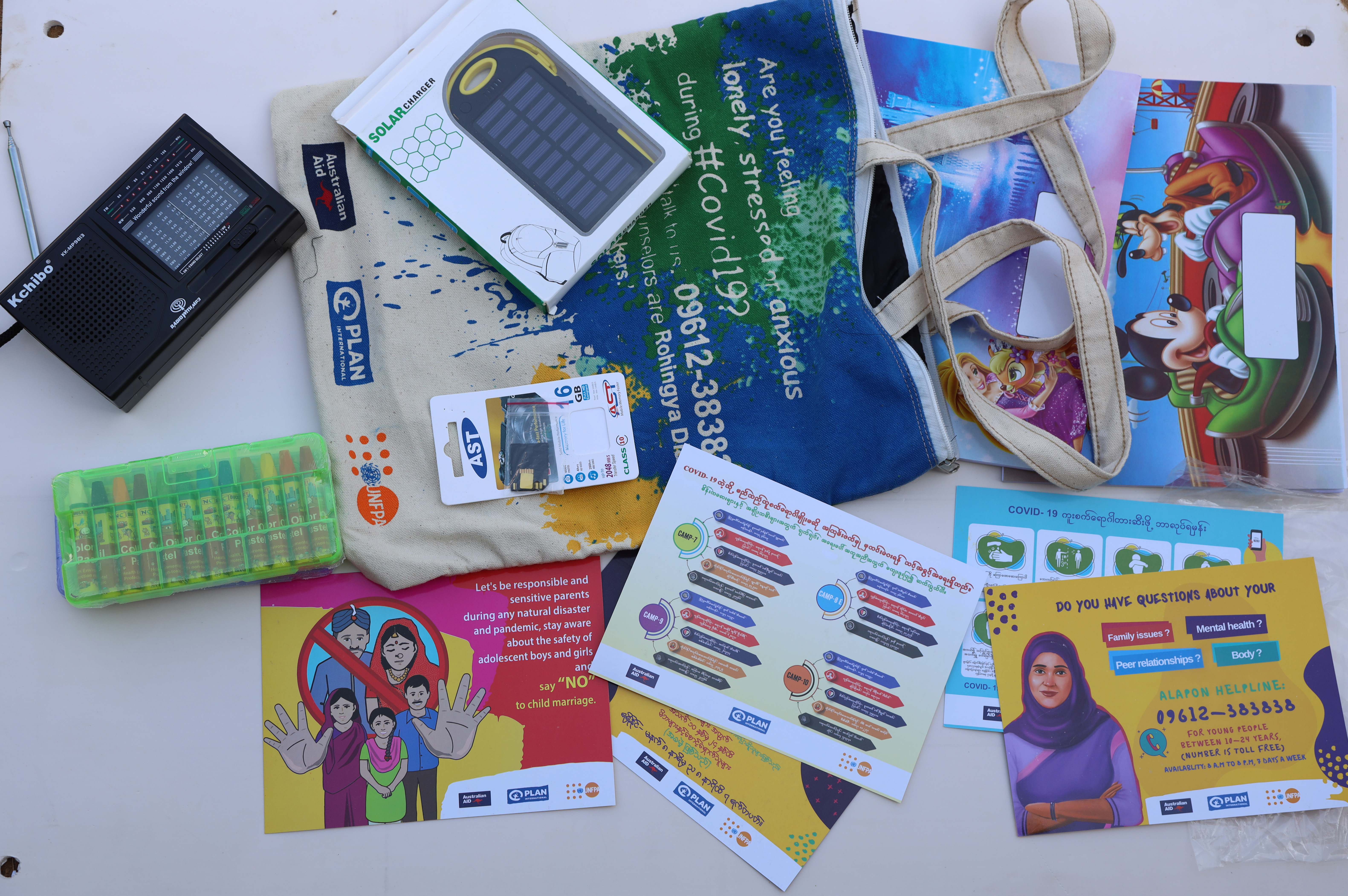
The Psychosocial Support Kits also included colouring books and pencils to keep the youth creative and occupied amidst the national lockdown. Photo: UNFPA/Fahima Tajrin
As providing life skills education has been challenging during the COVID-19 pandemic, UNFPA has launched novel initiatives to ensure that the youth population can continue to cultivate these skillsets remotely. With the generous support of Australia, psychosocial support kits containing a radio and a memory card full of pre-recorded, educational radio episodes were distributed to over 2000 adolescents in 2020. The radio episodes covered topics such as gender identity, peaceful conflict resolution, healthy nutrition and menstruation.
“From the episodes, I learned the dos and don’ts of menstruation. The information on healthy foods that are good for our body during our periods was completely new to me. I actually played the session for my mother, as she never had the opportunity to learn about these things when she was young. I have also shared what I have learned with my neighbors and friends, so my whole community is benefiting from the episodes,” shares 18-year-old Maimuna, one of the recipients of the kits and participant of UNFPA’s Champions of Change life skills programme.
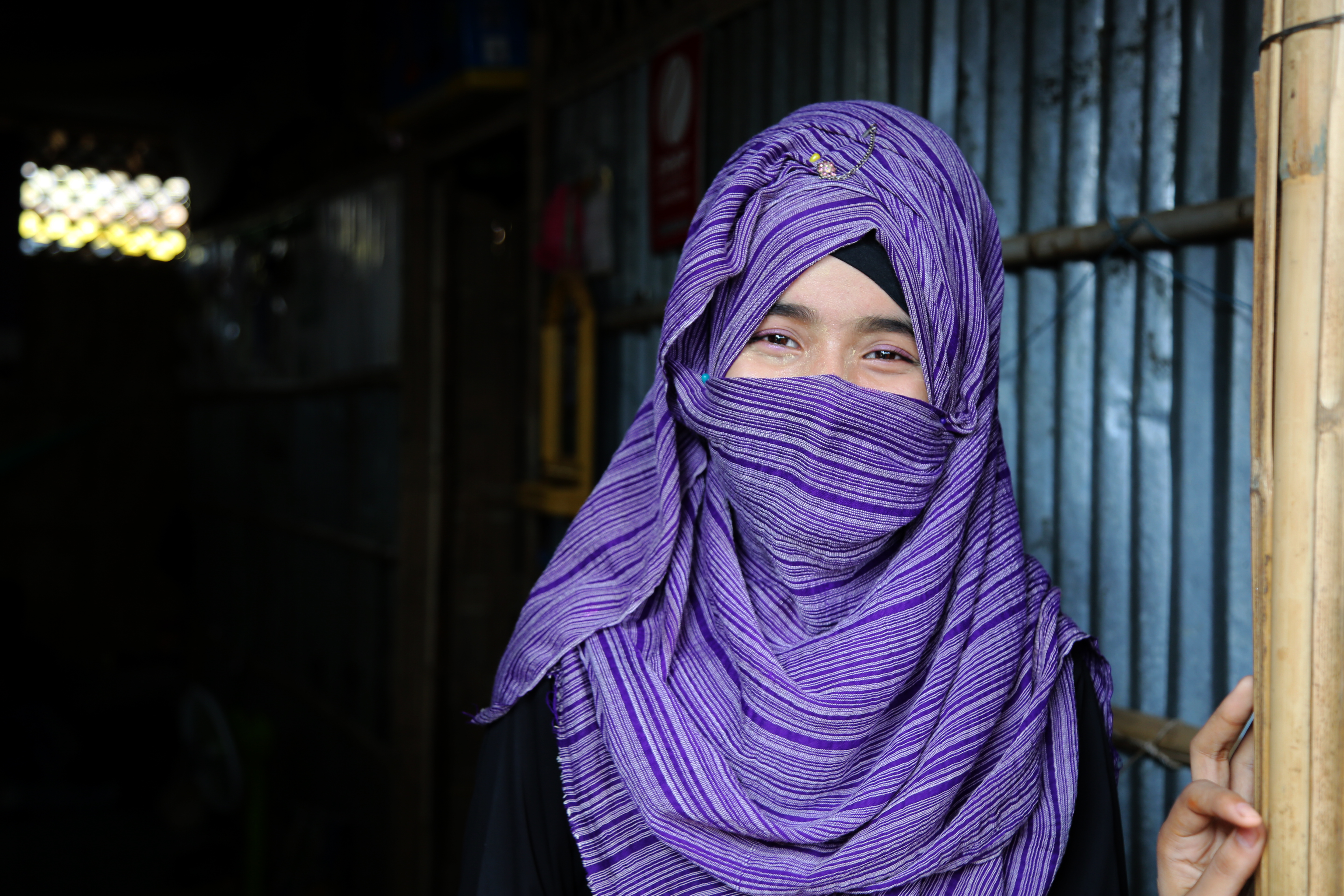
The radio episodes on life skills have not only made a difference for Maimuna, but her entire community. Photo: UNFPA/Fahima Tajrin
A possible future?
Even after four years, operating in the refugee camps continues to be challenging. COVID-19 has particularly put established ways of working to the test and made organizations rethink the way they approach humanitarian response. Despite these challenges, UNFPA has not lost its determination, and new innovations and ideas have begun to flourish.
For example, this year UNFPA has started to address lack of access to adequate menstrual hygiene products in the camps by training Rohingya women to produce their own reusable sanitary pads. UNFPA has also constantly arranged focus group discussions with women in the camps to keep track of their evolving needs and build the capacity of our staff members through training, including sessions on the Prevention of Sexual Exploitation and Abuse (PSEA).
While mobility restrictions and climate-related emergencies during the pandemic may have impeded or slowed down UNFPA’s essential operations from time to time, UNFPA’s efforts to address the ongoing crisis are currently more dynamic and creative than ever. For this, UNFPA thanks its donors including the Australian High Commission, Bureau of Population, Refugees, and Migration of the United States, Canada, Foreign Commonwealth and Development Office of the United Kingdom, Friends of UNFPA, Japan, New Zealand, Norway, the Republic of Korea and Sweden and United Nations Central Emergency Response Fund, all of whom have loyally continued to support UNFPA’s lifesaving work throughout these four years.
With renewed inspiration, UNFPA stands ready to push ahead despite the challenging times. Along with our many partners, we will not stop until every Rohingya person can be assured that their rights and choices are fully protected and that they have the opportunity to aspire for a better, more just future.

